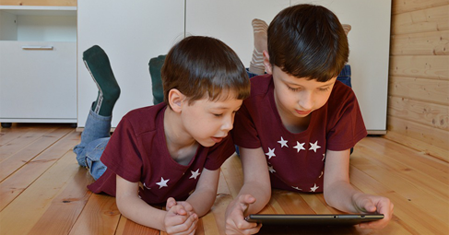Tablets can be good for your kids
 These days, everyone seems to be staring into a smartphone, and it's easy to think that gadgets are bad for children. That's obviously true if they're overused, but there's one device that youngsters love, and that's the tablet.
These days, everyone seems to be staring into a smartphone, and it's easy to think that gadgets are bad for children. That's obviously true if they're overused, but there's one device that youngsters love, and that's the tablet.
First introduced in the 90s, the tablet today is one of the top items desired by young and old alike. Around 58% of teenagers use tablets for fun and study, and 46% of families have at least one at their disposal. Parents don’t seem to have an issue with their children using them, finding them to have a positive effect on development.
Certainly, games and entertainment are paramount for the young, and they'll no doubt access and enjoy all the latest amusements. But this is a good opportunity for parents to spend time together with their children to experience some fun and learn how tech-savvy their children are. Also, playing games helps to improve kids’ thinking and understanding of many things.
While reading books and watching movies help with education, there are also educational aspects to many programs. For teenagers, it’s crucial to have access to a tablet for homework or for making presentations. It becomes a tool of organisation and ultimately of empowerment.
Gadgets are constantly updated, and allowing a child to use a tablet is a reasonable way to keep them up to date with the latest technological developments. They learn how to use settings and modify them to their needs. It’s very important for children to know how to use and manage equipment, as it’s a big step for development and adaptation in society. Gadgets are now a considerable part of modern life —70% of families with children under 12 say that their kids use tablets, with 77% of kids playing games, 57% pursuing educational purposes, and 55% getting entertained during traveling. A lower number of children use tablets to watch TV or communicate with others, so there are many positive aspects for kids using a tablet.
The thing is, they're relatively inexpensive (cheaper than a regular desktop computer). A tablet, with its price ten times lower, becomes a reasonable substitution for a regular computer, especially as a tablet combines multiple useful features, e.g. internet access, TV, mp3 players, game consoles, books, notebooks and drawing programs. A comfortable size and low weight give good portability for kids to carry around, and almost everything a young one might expect from a laptop or desktop PC is available.
Battery power is much improved of late, and the fast start-up means parents can entertain immediately and for a decent amount of time. For school, tablets can save time with rapid access to the information needed for learning or presentation. Tablets are a great way for parents to keep track of their kids’ learning and their habits.
Also, you can install an app on their tablet to keep track, or you can block inappropriate apps and sites. There are many options for parents. It’s actually difficult to speak about the cons these gadgets may have. There may be some, but it all depends on monitoring.
Don’t forget — modern tablets can turn into an essential part of life, with their abilities to increase features and install apps. Having a USB port, memory card slot or HDMI makes a tablet a real relief for parents and students alike.


